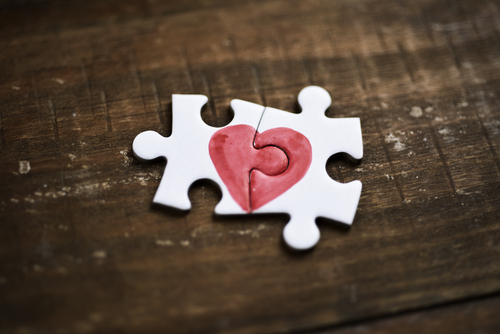What you will get from this article:
- Discover what makes a good partner
- Master how to be a better partner
- Learn the three relationship dimensions and identify yours
- Understand that to sustain a quality relationship you need to focus on your partner
- Unlock the strategies needed to positively shift your mindset about your relationship
How do you show up in your relationship – and for your partner? Do you consider yourself a good partner? What makes a good partner? Learning how to be a better partner takes a lifetime of practice and commitment, but the result is worth it: a stronger, more authentic relationship.
For so many of us, instead of asking how to be a good partner, we focus on what we are getting out of the relationship. It’s all about how our partner’s thoughts, feelings and actions impact us.
But what if we were to flip that focus into reverse and started putting our partners’ needs and wants first? What if we were to start focusing on giving instead of getting? How would this shift in mindset impact our relationship? Instead of asking “Are they a good partner?” the question becomes “Am I a good partner?”
What makes a good partner?
Everyone has different values and beliefs, goals in life and strengths and weaknesses they bring to a relationship. But there are several traits you can develop to learn how to become a better person in a relationship.
Self-awareness
The key to any deep, passionate relationship is understanding how you participate. Learning how to be a better partner requires you to look inward and develop self-awareness, or the ability to identify, understand and control your own emotions and behaviors. How do your fears, limitations and patterns get in the way of your capacity to connect – and stay connected – with the type of person who would light you up and who you could light up as well? What negative patterns have you developed that you subconsciously bring to your relationships? By working on your personal growth, you’re able to bring your best self to your partnership.
Empathy
If you want to maximize not only the quality of your relationship but the joy and fulfillment that you and your partner experience together, then it’s time to shift out of an egocentric mindset and to shift into serving your partner’s needs. Just think about it. There is nothing more intimate, nor any situation that brings out more of our fears or insecurities, than a romantic relationship. When you demonstrate how to be a better partner by practicing empathy, rather than exacerbate your partner’s angst, you step up and embrace the opportunity for connection.
Trustworthiness
Jealousy and possessiveness are two of the top causes of relationship arguments. Yet these are symptoms of a larger problem: insecurity and lack of trust. Trust is essential to any relationship, but how can you develop it? It starts with open and honest communication. This means practicing absolute courage and vulnerability, one of the Five Disciplines of Love. Communication enhances the sense of trust and security. Share your feelings and your dreams for the future. Be open about what you need and ask your partner to do the same. This will ultimately bring you closer together.
Positivity
No one is happy all the time, and it’s nearly impossible to always be in a good mood. Bringing positive thinking to your relationship – and to your life – isn’t about denying or suppressing negative emotions, but rather about working through them and continuing to see and appreciate the good in your partner. Don’t let your partner bear the brunt of your emotions. Always treat them with respect. Express how happy they make you. Remind them of all the things you love about them. Remember that as Tony says, “Trade your expectation for appreciation and the world changes instantly.”
The three types of relationships
It is important to fully recognize what dimension relationship you are in at this moment – that is, what type of dynamic you bring to your partner. Before asking how to become a better person in a relationship, ask yourself: Are you living in a one-, two- or three-dimensional relationship? Even more importantly, what are you willing to do to show up for your partner and achieve the type of relationship you’ve always wanted?
One-dimensional relationship
You know when you are in a one-dimensional relationship because it’s all about you – not about you and your partner. Rather than focus on how to be a better partner, your focus is on your needs being met and what you’re getting. You are only in the relationship as long as you are getting what you want.
Those on the receiving end of a one-dimensional relationship will be left feeling alone, unsupported and isolated, not like they have a good partner. They will feel like they must sacrifice their desires or compromise their needs in order to exist peacefully in the relationship. And eventually, because those needs aren’t being met, they will seek out other ways to fulfill those needs, creating further distance and disconnection in the relationship.

Two-Dimensional Relationship

This type of relationship is all about equality. Your focus is both on meeting your own needs as well as your partner’s. Your belief about what makes a good partner is, “I will take care of myself, you will take care of yourself. But if you can’t meet your own needs, then there’s nothing I can do about it.” This means you are still operating on an egocentric level.
It sounds fair, doesn’t it? Egalitarian. You do your part, I’ll do mine and let’s make this thing happen together. A true partnership. But while this may be great for a partnership, it’s devastating for polarity. If we are equal with our partners, there is zero polarity and zero passion. And the reality is that the vast majority of the population falls into this group, which creates unfulfilled relationships.
Three-Dimensional Relationship
In a three-dimensional relationship, you step up and take total responsibility for how the other person feels. You sincerely feel and believe, “Your needs are my needs,” and you will not stop or give up for any reason until you meet your partner’s needs. In this type of dynamic, understanding how to be a good partner means you operate on a world- or spirit-centric level.
When somebody says, “Listen, I’m doing everything I can, but you’ve got to go and do your part,” it may sound okay on the surface, but this will be depolarizing. A level-three relationship means that instead of saying, “We are going to split this,” you are saying “I am going to make sure you feel what you feel. Be crazy, do whatever you want. I love you. I will take you to the next level.” It is not “you do your part and I’ll do mine. You have to make yourself happy.” It’s “I live to light you up and I will do it.” In this state, the energy, the passion and the joy all come naturally. This is where we all want to be.
How to be a better partner
At which of these dimensions have you been operating in your relationship? At what dimension do you think your partner has been playing? Do you both even agree on what makes a good partner? And are you willing to work on becoming better?
Love yourself first
Your beliefs create your world. They drive every decision you make – including in relationships. If you have destructive beliefs, you’ll gravitate toward a life that reinforces those beliefs. You may bring negativity into your relationships that results in poor communication, conflict and frustration. Being a better partner starts with examining these beliefs and replacing them with empowering ones.
Learning how to be a better partner hinges on your sense of self. Once you’ve uncovered your limiting beliefs, you can work on your self-esteem. Remember to celebrate your strengths, weaknesses and everything you bring to the relationship as an individual. By grounding yourself in positive self-regard, you’re better able to show up in your relationship – you can only treat others as well as you treat yourself.

Understand that relationships are dynamic

Relationships are much like gardening. They are only able to flourish under the right conditions. A garden’s needs change as the seasons shift, and some plants need more attention than others. Your relationship is similar – it’s a living, breathing entity that needs constant TLC. Change in relationships is as inevitable as the seasons, but you can learn to be flexible and adapt to whatever comes your way.
Being flexible in relationships isn’t the same as settling. You can learn to adapt to your partner’s needs while staying true to your own. Flexibility is about being willing to hear your partner’s needs and fulfilling them in a way that brings you closer together. Circumstances in life will always shift – but an adaptable relationship will be able to weather the seasons and come out stronger.
Focus on your partner
If you want to create real, lasting change in your relationship, then stop focusing on what your partner is or isn’t doing, and start asking yourself, “What am I giving? How am I being a good partner?” By asking how to be a better partner to your significant other, you’re shifting toward a world-centric level and putting your partner’s needs first.
This doesn’t mean you’re negating your own needs. You are letting your partner know you are there for them, that they can trust you – and that they can feel safe and secure in their vulnerability. And, in turn, this will strengthen your bond of intimacy and connection, helping you ultimately surpass being merely a good partner as your relationship becomes extraordinary.

Take time to connect
Making small talk and communicating are not the same thing. Many relationships fall into the same routine, with questions like “How was your day?” or “What do you want to do tonight?” We spend our time together watching television rather than truly connecting. But you cannot know what your partner needs if you don’t take the time to deeply communicate in your relationship.
Improve your communication

Communication isn’t just about talking. Deep listening will make your partner feel not only heard, but understood. Make eye contact, give nonverbal feedback and focus on what they are saying. Be open and accepting. Rather than being your partner’s worst critic, be understanding. Listen to your partner’s perspective without judging it. You’re relating to your partner and building trust in the relationship. Work on practical relationship skills like conflict resolution, being fully present for your partner, taking an interest in what makes them happy and picking up on their nonverbal cues.
Express gratitude
Gratitude is essential to every part of life, including your relationship. Don’t just think about everything you love about your partner – tell them. Say “thank you,” and be specific about what you appreciate. And always share positive emotions. When you feel and express joy and pleasure in a relationship, you become a soft spot for your partner to fall on.
Give assurance
Whether someone had a bad day or there is a longer-term issue, stress can negatively affect both partners in a relationship. Remember that having their back is part of mastering how to be a great partner in a relationship. When your partner is having a hard time, give them assurance of your unconditional support.
Open up
Feeling comfortable around your partner is the first step to real intimacy. When you’re able to be vulnerable, you’ll be able to learn how to be a good partner in a relationship. In an emotionally healthy relationship, you’re able to share your thoughts, feelings, wants and needs without fear of judgment or criticism. And in return, you don’t judge your partner – you accept them as they are.

Share responsibilities
You can’t create an equal, fulfilling partnership if one person bears all the responsibility. Be proactive and share responsibilities like household tasks and finances. Need an incentive? One study found that couples who split housework more evenly engaged in intimacy more frequently than those with uneven arrangements.
Stay engaged
People are social creatures, and learning how to be a better partner requires you to have a support system. When you spend time with your partner’s friends, family and larger network, you build bonds that strengthen the relationship. Show your partner that you don’t just love them, but you also love what, and who, they love – and you want to be a part of their entire life.
Ready to become a better partner?
Uncover how to be a good partner with Tony Robbins’ Ultimate Relationship Guide. Learn how to put your partner’s needs first and create lasting change in your relationship.